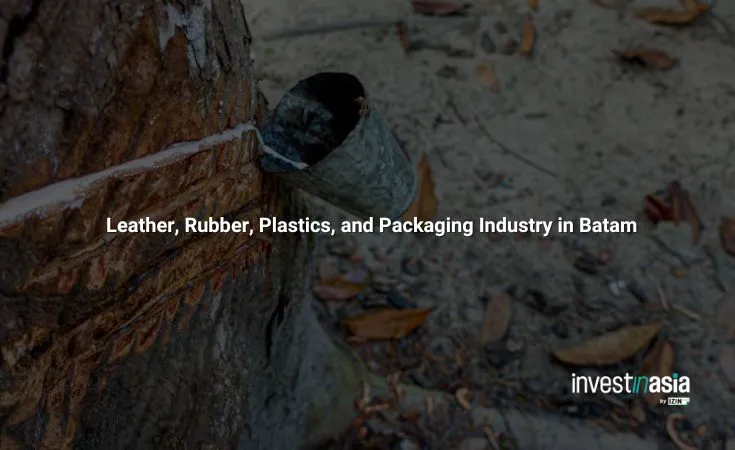Batam has become one of Southeast Asia’s most dynamic manufacturing zones—especially for the Leather, Rubber, Plastics, and Packaging sectors. With 85 active companies and growing foreign direct investment, this industry cluster is now Batam’s second-largest FDI contributor. Strategically located near Singapore and equipped with industrial-grade infrastructure, Batam offers a compelling ecosystem for local and foreign investors alike.
This guide explores Batam’s industrial landscape for these sectors, including opportunities, challenges, government support, and how to start a business—especially for foreign investors.
Also read: Leading Industries in Batam: A Blueprint for Southeast Asia’s Industrial Future
Why These Industries Thrive in Batam


Batam’s Leather, Rubber, Plastics, and Packaging industries benefit from key geographical, regulatory, and infrastructural advantages:
- Proximity to Singapore (20km) enables fast logistics and supply chain access to ASEAN and global markets.
- Free Trade Zone and Free Port status eliminates many import/export duties and bureaucracy.
- Industrial parks such as Batamindo, Panbil, and Citra Buana offer plug-and-play infrastructure.
- Skilled labor trained by vocational institutions focused on manufacturing needs.
Also read: Batam’s Economic Growth: A Strategic Guide for Businesses and Investors
Sector Highlights
Leather Industry
Manufacturers like PT Daewon Eco Indonesia and Five Star Auto Leather serve automotive and consumer markets with synthetic leather and upholstery. With growing demand from Singapore and Malaysia, Batam is ideal for high-margin, export-focused leather businesses.
Rubber Industry
PT HLN Batam, PT KwongFai, and PT Yokohama specialize in technical rubber components for marine, automotive, and medical sectors. Batam’s rubber sector is ISO-certified and backed by decades of R&D and proprietary formulation.
Plastics Industry
Companies like PT Suntech, Sansyu Precision, and Cicor Batam focus on precision injection molding. Applications include electronics, telecom, home appliances, and healthcare. With ISO Class 7 clean rooms, Batam is ready for high-spec production.
Packaging Industry
Packaging is a key support industry in Batam. Firms like PT Interpak, Metric Packages, and Asia Paperindo produce corrugated boxes, foam packaging, and retail-ready cartons. These companies serve in-house manufacturing tenants and export clients.
Advantages for Foreign Investors


Foreign companies have several strategic reasons to establish operations in Batam:
- Ease of Entry: Batam welcomes foreign ownership with clear pathways for PT PMA (foreign-owned limited liability company) registration.
- Low Operating Costs: Labor and logistics costs are significantly lower than in Singapore or Malaysia.
- Tax Incentives: Investors benefit from VAT exemptions, import duty relief, and accelerated depreciation.
- Supportive Authorities: BP Batam offers dedicated assistance for business licensing, land access, and factory leasing.
Also read: Incentives for Business and Investment in Batam
Challenges to Consider
Although Batam provides a solid foundation, investors must be ready to address certain challenges.
- Environmental Compliance: New regulations prioritize low-carbon and sustainable manufacturing, particularly in the Tembesi Innovation District.
- Talent Competition: As more companies enter, securing skilled labor may require better compensation or training programs.
- Infrastructure Bottlenecks: Although improving, certain ports and utilities may still face congestion during peak demand.
Government Initiatives and Future Outlook
BP Batam has announced an ambitious development blueprint through 2045, focusing on:
- Rp 115 trillion annual investment target
- Tembesi Innovation District, a low-carbon manufacturing zone with a 40 MW floating solar farm
- Digitalization and Smart Manufacturing Programs to increase productivity and compliance
Batam’s future lies in combining its strong industrial base with green, high-tech, and export-oriented strategies.
Also read: Why Batam Is a Smart Choice for Doing Business
How Foreigners Can Start a Leather, Rubber, Plastics, or Packaging Business in Batam
Foreigners looking to establish operations in Batam can register a PT PMA and operate legally. Here are the steps:
- Business Planning – Choose your sector, business classification (KLU), and facility type.
- Company Incorporation – Register your PT PMA with legal domicile and NIB (Business Identification Number).
- Location Selection – Lease factory space in an approved industrial estate like Batamindo or Panbil.
- Licensing & Tax Registration – Secure operational permits and tax status, including potential PKP (VAT collector) eligibility.
- Recruitment & Operations – Hire local talent or apply for expatriate work permits as needed.
Also read: Complete Requirements for Company Registration in Batam
InvestinAsia: Your Bridge to Batam’s Manufacturing Sector
Setting up a business in Batam involves navigating licensing, land leases, and regulatory permits. InvestinAsia’s Batam Business Registration Service streamlines the process for foreign investors.
From company registration to tax compliance and office setup in industrial parks, InvestinAsia provides end-to-end support—so you can focus on production, not paperwork.
Contact us now for FREE consultation!
Batam is quickly becoming a manufacturing powerhouse for the Leather, Rubber, Plastics, and Packaging sectors. With advanced infrastructure, government incentives, and international trade accessibility, it’s a destination that aligns with the needs of modern, export-driven industries.
If you’re ready to expand into Batam’s fast-growing industrial sector, InvestinAsia offers the local expertise and legal know-how to make your entry smooth and compliant.
Take the first step—talk to our expert today and explore your potential in Batam.
FAQs
Is Batam suitable for foreign manufacturers?
Yes. Batam offers a Free Trade Zone, skilled labor, and excellent proximity to Singapore, making it ideal for international manufacturers.
What are the key industries in Batam?
Batam’s top sectors include electronics, precision manufacturing, and Leather, Rubber, Plastics, and Packaging.
What is the minimum investment to set up a company?
For a PT PMA, the minimum investment requirement is IDR 10 billion (~USD 650,000), including paid-up capital.
Can I own 100% of a business in Batam as a foreigner?
Yes, many manufacturing sectors allow 100% foreign ownership under the current Investment Negative List exemptions.
What is the Tembesi Innovation District?
It’s a new low-carbon industrial park in Batam focusing on green and sustainable manufacturing, opening in 2025.
References:
The Jakarta Post. Batam’s 7 strategic sectors prioritized for development until 2045. https://www.thejakartapost.com/front-row/2024/06/20/batams-7-strategic-sectors-prioritized-for-development-until-2045.html.
BP Batam. BATAM INDUSTRIAL ESTATE. https://bpbatam.go.id/wp-content/uploads/2020/12/Batam-Industrial-Estate-Rev-3.pdf.
BP Batam. Leading Industries. https://bpbatam.go.id/en/investment-2/investment-opportunities/investment-advantages/key-industries/.



